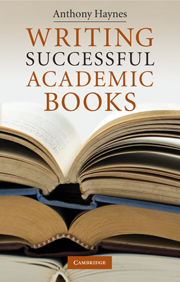Book contents
Summary
Experienced editor and Visiting Professor at Beijing Normal University Anthony Haynes has provided a highly useful guide for authors of academic books. Authors are very competent in their specialism; however, they may encounter problems in negotiations with the publisher, in presenting their material in book form, etc. Anthony Haynes shares his broad competence on all the stages of writing and editing academic books.
Often academicians have trouble answering the question ‘Should I write a book?’ Professor Haynes erases all doubt, indicating that writing a book is a part of self-realisation, it raises one's self-esteem, and fosters career development. Thereafter he leads the author through the process of writing.
Anthony Haynes explains how to evoke an editor's interest in asking you to write a book. He writes in lively detail on how to compose a book proposal and gives an example, which includes an interesting analysis of competing titles. In the proposal, one has to indicate who will buy the book and why, as well as make decisions about the style of presenting content.
The writing process begins with the incubation of ideas and planning. Professor Haynes explains the pros and cons of linear and non-linear planning, gives hints for the division of chapters into subsections, using questions in plans, and composing a word budget. He stresses the idea that you should not do too much self-editing while first drafting your book. The process of redrafting is also very important, and effective ways for redrafting are depicted. Interesting ideas about the opening sentence of a paragraph and the tone of writing are presented.
- Type
- Chapter
- Information
- Writing Successful Academic Books , pp. xiii - xivPublisher: Cambridge University PressPrint publication year: 2010



